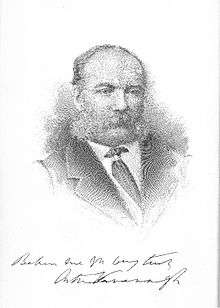Arthur MacMurrough Kavanagh

Arthur MacMorrough Kavanagh (25 March 1831 – 25 December 1889) was an Irish politician.
Biography
Kavanagh was born at Borris House in County Carlow, the son of Thomas Kavanagh MP and Lady Harriet Margaret Le Poer Trench, daughter of the second Earl of Clancarty. His father traced his lineage to the ancient Kings of Leinster through Art MacMurrough-Kavanagh. He had only the rudiments of arms and legs, though the cause of this birth defect is unknown.
Placed in the care of the well-respected doctor Francis Boxwell, who believed that even an armless and legless child could be "trained" to live a productive life,[1] Kavanagh learnt to ride horses at the age of three by being strapped to a special saddle and managing the horse with the stumps of his arms; he also went fishing, hunted animals, drew pictures, and wrote stories, with various mechanical contraptions being devised to supplement his limited physical capacities.
In 1849, Kavanagh's mother discovered that he had been having affairs with girls on the family estate, so she sent him into exile to Uppsala, and then to Moscow with his brother and a reverend, whom he came to hate.[1] He travelled extensively in Egypt, Anatolia, Persia, and India between 1846 and 1853; in India, his letter of credit from his mother was cancelled when she discovered that he had spent two weeks in a harem, so he persuaded the East India Company to hire him as a despatch rider.[1] Other sources say that this was due to the death of his eldest brother Charles of consumption in December 1851, which left him with only 30 shillings.[2]
In 1851, Kavanagh succeeded to the family estates and to the title of The MacMurrough following the death of his older brother Thomas. He married his cousin, Mary Frances Forde-Leathley, in 1855. Assisted by his wife, he was a philanthropic landlord, active county magistrate, and chairman of the board of guardians. Together, they had seven children: Eva (died 1896), May (died 1949), Agnes (died 1932), Walter (died 1922), Arthur (died 1882), Charles (died 1950), and Osborne (died 1897).[3]
Kavanagh served as High Sheriff of County Kilkenny for 1856 and High Sheriff of Carlow for 1857. A Conservative and a Protestant, he sat in Parliament for County Wexford from 1866 to 1868, and for County Carlow from 1868 to 1880. On being elected, he had to be placed on the Tory benches by his manservant; the Speaker, Evelyn Denison, gave a special dispensation to allow the manservant to stay in the chamber during sittings.[1] Kavanagh was opposed to the disestablishment of the (Anglican) Church of Ireland, but supported the Land Act of 1870. On losing his seat in 1880, William Ewart Gladstone appointed him to the Bessborough Commission, but he disagreed with its conclusions and published his own dissenting report. In 1886, he was made a member of the Privy Council of Ireland.
Kavanagh died of pneumonia on 25 December 1889 in London, and was buried in Ballicopagan cemetery.[4][5] He was succeeded in the title of the MacMurrough by his son, Walter MacMurrough Kavanagh, who also served as MP for County Carlow from 1908 to 1910.
References
 This article incorporates text from a publication now in the public domain: Chisholm, Hugh, ed. (1911). "Kavanagh, Arthur Macmorrough". Encyclopædia Britannica (11th ed.). Cambridge University Press.
This article incorporates text from a publication now in the public domain: Chisholm, Hugh, ed. (1911). "Kavanagh, Arthur Macmorrough". Encyclopædia Britannica (11th ed.). Cambridge University Press.
- 1 2 3 4 David Cohen (9 February 2011). "The truly remarkable Kavanagh MP". The Times. p. 6.
- ↑ "The Limbless Wonder". The world's strangest mysteries. New York: Gallery Books. 1987. p. 647. ISBN 0-8317-9678-2.
- ↑ Rt. Hon. Arthur MacMorrough Kavanagh, The MacMorrough The Peerage
- ↑ Arthur MacMurrough Kavanagh : 1831–1889 Clan Caomhánach
- ↑ Ballicopagan Cemetery, Ancestry.com
External links
- Arthur MacMurrough Kavanagh : 1831–1889
- Hansard 1803–2005: contributions in Parliament by Arthur MacMorrough Kavanagh
- Kavanagh on 'The Long Riders' Guild'
- Kavanagh on 'The Peerage' website
- 'Disability history month: Arthur MacMorrough Kavanagh' on BBC News
| Parliament of the United Kingdom | ||
|---|---|---|
| Preceded by Sir James Power John George |
Member of Parliament for Wexford County 1866–1868 With: Sir James Power, Bt |
Succeeded by John Talbot Power Matthew Peter D'Arcy |
| Preceded by Henry Bruen Denis William Pack Beresford |
Member of Parliament for Carlow County 1868–1880 With: Henry Bruen |
Succeeded by Edmund Dwyer Gray Donald Horne Macfarlane |
| Honorary titles | ||
| Preceded by The Earl of Bessborough |
Lord Lieutenant of Carlow 1880–1889 |
Succeeded by The Lord Rathdonnell |